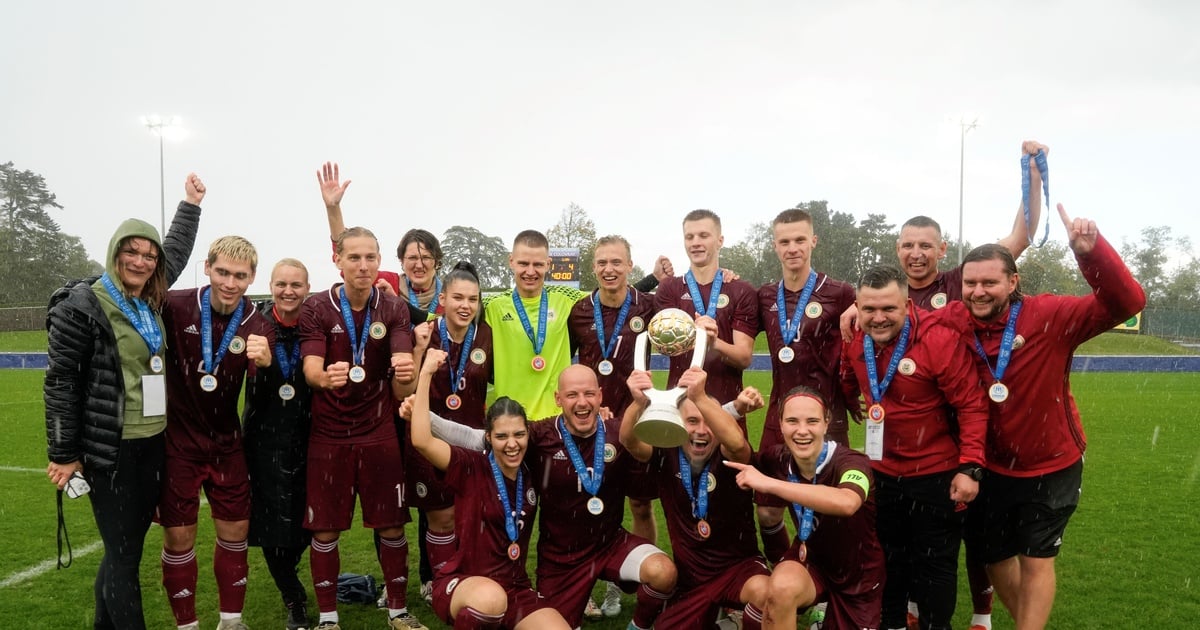The third edition of the Unity EURO Cup took place today in Nyon, celebrating not only football but also inclusion, diversity and the unifying power of sport. Hosted at UEFA’s headquarters in Switzerland, where the inaugural event was held in 2022, this year’s tournament once again emphasised football’s vital role in breaking down cultural barriers and fostering connections between people from different backgrounds.
Sixteen national teams competed, featuring male and female refugees integrated alongside players from their host communities. This event provided a unique opportunity for these players to connect and engage, demonstrating how football can act as a bridge for integration and language of mutual understanding. Latvia triumphed in a thrilling final against Finland (4-1), but today’s true victory was not defined by the result, but rather by the spirit of participation, friendship and respect.
The Unity EURO Cup is among the essentials within UEFA’s football sustainability strategy for 2030, which prioritises the inclusion of refugees, asylum-seekers, and displaced individuals into their host societies through sport. Aligned with the UNHCR’s Sport Strategy – More than a Game – the tournament showcases how sport can be a powerful force for social cohesion, highlighting its potential to improve the lives of displaced and stateless people worldwide.
Reflecting on the importance of the event, Michele Uva, UEFA social & environmental sustainability director said: “Today’s Unity EURO Cup is a testament to football’s unique ability to unite people from diverse backgrounds. By bringing together refugees and host communities, we are not only celebrating the beautiful game but also promoting inclusion, understanding, and mutual respect. The Unity EURO Cup exemplifies UEFA’s commitment to using football as a powerful tool for social integration and positive change. A special thank you to the UEFA team for their exceptional dedication and hard work in organising this tournament.”
“This tournament illustrates the power of sport to bring people together, break down barriers and inspire hope,” said Filippo Grandi, United Nations High Commissioner for Refugees. “For people forced to flee their homes, sport is more than just a game – it is a way towards healing, growth, inclusion and belonging. Every day, we see how these opportunities help refugees rebuild their lives, and today’s event is a shining example of that transformation.”
The tournament’s third edition saw more than 200 young people competing in a total of 33 matches. The 16 teams brought together refugees and football associations from Armenia, Belgium, Finland, France, Germany, Greece, Italy, Latvia, Malta, the Netherlands, Northern Ireland, the Republic of Ireland, Slovenia, Spain and Switzerland. Additionally, a team of Ukrainian refugees living in Germany represented their homeland, Ukraine.
As Latvia lifted the trophy, the spirit of the Unity EURO Cup shone through, reminding everyone of football’s power to heal, unite and inspire hope for a better future for both the refugees and the communities that welcome them.
The tournament not only allows the refugee players to represent their host countries but also gives them an international stage to showcase their talents and share their stories. Latvia captain Oleh Lazyrka said after leading his team to victory: “Every sport helps refugees, but football, in particular, because when we play it, we feel united, it’s like a big family.”
Johan Djourou, ambassador of the Unity EURO Cup Switzerland team echoed these sentiments: “Football and sports gives you a sense of freedom, of being part of something: you can play it together, laugh together, agree or disagree together. This is why sports is so important in our society. For refugees it is also the case, it gives them hope and the feeling that they are becoming a member of their host community.”
Note to media
Pictures of the tournament are available here for editorial use only.
